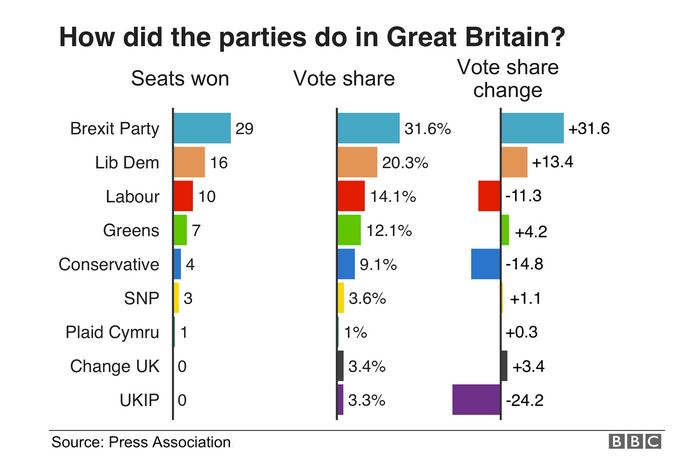Thanks to West Country Bylines for collating this twitter thread.
Tag Archives: Referendum
We Voted Three Times To Leave!

It’s an argument that Leavers keep trotting out. I heard David Davis on BBC Any Questions repeat it only yesterday, 20th September 2019.
It goes like this: the public voted overwhelmingly for Brexit. First, in the 2016 Referendum. Second, in the 2017 General Election, in which over 80% of votes were for parties “respecting the referendum”. And thirdly, in the 2019 EU elections, in which the Brexit Party won most seats.
There’s a technical term for this argument: it’s bullshit.
THE 2016 REFERENDUM
First, the 2016 Referendum was won on a wafer-thin majority, of 51.89% to 48.11%. That is not “overwhelming”. In a town hall meeting of 101 people, 49 of them would have been Remain. In such a show of hands, you’d be hard pressed to conclude anything but division, right down the middle. No conclusion; no decision to be inferred; no action to be taken.
Of course the referendum wasn’t just close, it was bent. Many were excluded from the franchise (including many UK citizens living abroad, and EU citizens living in the UK – all of whom are in the direct firing line of any Brexit policy). The Leave campaigns broke the law, harvested our data with the help of Cambridge Analytica, and funded their dark ops with money sourced from god knows where. Over a billion Facebook ads were “dropped” in the days before the vote, and we don’t know much about them because they were tailored, but it’s safe to guess that they were as honest as the lie on the side of the Leave campaign’s bus. Investigations are ongoing.
THE 2017 GENERAL ELECTION
What about the General Election of 2017? Over 80% of us voted for parties supporting Brexit. Isn’t that the mandate to trump all mandates? It’s true that Labour talked a positive talk on Brexit. But they have famously equivocated, trying to hold their Remain supporters on-side. Many, or probably most, Labour voters did so while holding their noses on the party’s Brexit stance. They voted Labour for many reasons, but not for Labour’s Brexit position. They voted Labour because they hoped the Brexit stance would change, or because their local MP assured them that it would, or because they had no decent local alternative, or because they were tribally Labour, or because they valued Labour’s policies on matters not related to Brexit, or because they were loyal to a hard-working incumbent MP. I was one such voter. You may NOT count my vote as a pro-Brexit vote.
If you want further evidence of support for or against Brexit, hold a Brexit referendum, not a General Election. (A fair, inclusive, legal and honest one this time, please.) The General Election results of 2017 tell us next to nothing about popular support for Brexit.
THE 2019 EU ELECTIONS
What about the big win for the Brexit Party in the 2019 EU elections?

The Brexit Party won a whopping 29 seats and 31.6% of the vote. Impressive.
But was that an overwhelming vote for Brexit? Combined with the Tories’ 9.1%, the pro-Brexit vote was 40.7%.
Voters’ support for Labour MEP candidates like Seb Dance, who had demonstrated great commitment to our membership of the EU, cannot be added to that 40.7%. 40.7% does not constitute a majority.
The 2019 EU Elections did not show a majority for Brexit.
The 2017 General Election doesn’t tell us anything about popular Brexit support.
The 2016 Referendum – bent, bought and restricted – delivered an inconclusive verdict.
When you hear the likes of David Davis peddling the lie that the people voted “not once, not twice, but three times” for Brexit, you could be forgiven for asking yourself why, three years on, the lie is even necessary. Shouldn’t the supposed mandate be irrelevant by now, as we contemplate the coming-to-bloom of those much-vaunted Brexit opportunities? Shouldn’t we be readying ourselves for our moment in the sun, our arrival on the global political stage, our imminent economic dominance, our glorious freedom? The question of why we’re doing this, and on what basis, should long ago have been forgotten and displaced by the heady scent of obvious benefits, just around the corner.
Or is this “once, twice, three times a lady” argument the only song the David Davises of this world have left to sing?
It’s not big and it’s not clever
Politicians keep telling us a lie. It’s much-repeated, but that doesn’t make it true. Here’s Andrea Leadsom pushing it, but she’s only one of many who do so, pretty much daily, and always unchallenged.
Leadsom, just like the others reading from the same briefing notes, says the 2016 Referendum result was “the biggest democratic decision in our history”.
But it wasn’t.
It wasn’t the “biggest”. It wasn’t “democratic”. And it wasn’t a “decision”.
Biggest?
Fewer people voted in 2016 (33.552m) than in the 1992 General Election (33.614m) – despite population growth of 14%.
There has been far better turnout than 2016. 72% in 2016 v 78% in 1992 v 84% in 1950 for example.
And don’t forget the obvious – the majority was wafer thin. 2016 Referendum Vote Leave: 51.9%. v 1975 Referendum Vote In: 67%.
On any meaningful measure, 2016 wasn’t the “biggest”, and, with population growth factored in, it wasn’t the biggest on any measure.
Democratic?
- Disenfranchised Voters
- Cambridge Analytica
- Side-of-a-Bus Lies
- Spending Lies
- Dark Money
It wasn’t democratic. It was as bent as a nine-rouble note.
(It might have been “the most bent” democratic exercise in our history, but perhaps that is not what Andrea meant.)
Decision?
Three years on, as the ferocity of argument between – and inside – political parties demonstrates, the meaning of Brexit is still being debated.
It means (and meant) different things to different people. Those 51.9% were not united in one vision. There was no single “decision.”
Not Big and Not Clever
The 2016 Referendum wasn’t the biggest, it wasn’t democratic, and it wasn’t a decision.
Lead Not Leave
Proud, as ever, to be a small part of the Silverfish team behind this great Gordo film which had millions of views across social media.
Lead, Not Leave!
